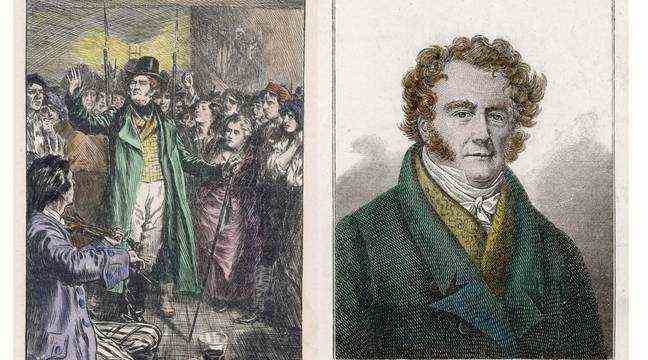In his office, rue Sainte-Anne, in Paris, the head of the 2nd division of the prefecture of police, Jean Henry, attentively reads the letter sent by a detainee. The policeman has already met its author, a certain Eugène-François Vidocq. It was right here, on a cold morning in March 1809. This little thug, the son of a baker from Arras, in the North, had come to offer him his services. The thirty-something had been sentenced to prison ten years ago for a story of “forgery in public and authentic writings”. He had already escaped twice from the prisons of Brest and Toulon, and had vowed never to return there. On the run, he had the idea of redeeming himself by working as an informer for the police, he who knows the world of the underworld better than anyone.
Faced with the civil servant, this fellow with the impressive build and the enormous patter assured him that he could make Napoleon’s Empire a little more secure. “During this period, you shouldn’t go for a walk in the countryside”, explains historian and journalist Xavier Mauduit, author of the book. Vidocq: an epic life *. “There are gangs like the foot-drivers, who burned the feet of the peasants to make them confess where they were hiding their booty. In cities, at night, the streets are cutthroat, he describes. And there are all the soldiers of Napoleon’s army who return home, have no job, but know how to handle weapons and are not too afraid of blood. Vidocq arrived saying: “I will solve the problem for you”. “
Thousands of arrests
At the time, Jean Henry wondered if he could really trust the thirty-something, content to thank him. A few months later, Vidocq was again arrested by the police. And from his cell in La Force prison, he took up his pen to beg the policeman to accept his proposal. This time, after having read his mail, the head of the 2nd division accepts. On the strength of the reputation that precedes him, the detainee will endeavor, over the following months, to provide him with information on the fellow detainees who confess to him, convinced that they are part of the same world. Over time, Jean Henry understands that his indicator could use his perfect knowledge of the environment to roam the streets of Paris and denounce the thugs he frequents.
In March 1811, Vidocq fled from prison with the complicity of Jean Henry and the Minister of Police, without arousing the suspicions of his fellow prisoners. Outside, he has a series of successes. “Vidocq is at the origin of thousands of arrests because he knows how to do, he knows the thugs, spots them, has networks of informers. It derives its legitimacy from its efficiency, ”emphasizes Xavier Mauduit. In 1812, Henry proposed to his protégé to create a security brigade, responsible for investigating the most serious crimes: murders, assassinations, rapes, armed robberies … To carry out his mission, he recruited agents “who have address books ”, a criminal record. He disguises himself, uses pseudonyms, infiltrates among criminals and does not hesitate to provoke crime.
Unorthodox methods
Vidocq and the security cross the times and the changes of political regimes. In 1818, Napoleon’s Empire collapsed like a deck of cards in Waterloo. Vidocq, officially still on the run, is pardoned by King Louis XVIII, Louis XVI’s brother, back on the throne of France after years of exile. But his unorthodox methods are starting to be criticized by the government, which wants to change the police. “The creation of the police as we know it is very late, at the end of the 19th century and the beginning of the 20th century. At the time of Vidocq, we are rather afraid when we meet a police officer, ”notes Xavier Mauduit. Unable to count on the support of Jean Henry, who left the police in 1821, Vidocq, 52, was gradually removed until he resigned in 1827. He settled near Paris, in Saint-Mandé, and immersed himself in the writing of his memoirs.
“Vidocq writes his own legend, although many things are invented”, insists Xavier Mauduit. At the same time, he inspired Victor Hugo to play the character of Jean Valjean and Balzac that of Vautrin. In 1833, eager to resume service as an investigator, he founded the Bureau of Information for Commerce, which was nothing less than the first private detective agency. He died at the age of 82 on May 11, 1857.
“A policeman today cannot recognize himself in him”
Two centuries later, what remains in the Vidocq police force? “Whenever there is rogue business, there is a little Vidocq that appears. Except that today, it is very marginal, whereas at the time, it was part of the institution, ”said Xavier Mauduit. But, he says, “a policeman today cannot recognize himself in this character, because he is the opposite of all the ethics of the profession”.
* “Vidocq: an epic life”, by Xavier Mauduit, Bayard Culture editions, 370 pages, ISBN 978-2227494695, 19.90 euros

